 Our World
Our World  Our World
Our World  Crime
Crime 10 Dark Details of the “Bodies in the Barrels” Murders
 Animals
Animals The Animal Kingdom’s 10 Greatest Dance Moves
 Movies and TV
Movies and TV 10 Box Office Bombs That We Should Have Predicted in 2025
 History
History 10 Extreme Laws That Tried to Engineer Society
 History
History 10 “Modern” Problems with Surprising Historical Analogs
 Health
Health 10 Everyday Activities That Secretly Alter Consciousness
 History
History Top 10 Historical Disasters Caused by Someone Calling in Sick
 Animals
Animals 10 New Shark Secrets That Recently Dropped
 Movies and TV
Movies and TV 10 Forgotten Realities of Early Live Television Broadcasts
 Our World
Our World 10 Places with Geological Features That Shouldn’t Exist
 Crime
Crime 10 Dark Details of the “Bodies in the Barrels” Murders
 Animals
Animals The Animal Kingdom’s 10 Greatest Dance Moves
Who's Behind Listverse?

Jamie Frater
Head Editor
Jamie founded Listverse due to an insatiable desire to share fascinating, obscure, and bizarre facts. He has been a guest speaker on numerous national radio and television stations and is a five time published author.
More About Us Movies and TV
Movies and TV 10 Box Office Bombs That We Should Have Predicted in 2025
 History
History 10 Extreme Laws That Tried to Engineer Society
 History
History 10 “Modern” Problems with Surprising Historical Analogs
 Health
Health 10 Everyday Activities That Secretly Alter Consciousness
 History
History Top 10 Historical Disasters Caused by Someone Calling in Sick
 Animals
Animals 10 New Shark Secrets That Recently Dropped
 Movies and TV
Movies and TV 10 Forgotten Realities of Early Live Television Broadcasts
10 Mind-Blowing Things that Happened this Week (11/29/19)
In today’s hyperfast political environment, keeping on top of the news can seem a Herculean task. So why not let us do the hard work for you? Every Friday, Listverse rounds up the most essential stories from the week, from the world-changing, to the shocking, to the inspiring.
This being Thanksgiving week, a significant chunk of this week’s news was viewed through a haze of turkey, alcohol, and/or blistering family arguments. But while America pigged out and remembered the past, the rest of the world kept right on careening toward the precipice marked “the future”. There were political earthquakes in Israel, actual earthquakes in the Balkans, and the possibility of the world’s newest nation being founded in the Pacific Ocean. Let’s do this thing.
10 Israel’s Prime Minister was Charged with Bribery

We briefly touched on this in last week’s column, but it’s such a huge story that it should probably get it’s own entry. So here it is. Last Thursday, Israel’s Attorney General announced he had reached a decision regarding the three pending cases against Prime Minister Benjamin Netanyahu for fraud, corruption, and bribery. “With a heavy heart,” he was going to officially charge the PM in all three cases. Netanyahu is now the first sitting PM in Israeli history to be accused of bribery.
To say Netanyahu reacted maturely would be to tell a lie so brazen even Keyser Soze would balk at it. The 70-year old claimed a coup was underway, attacked the integrity of the Israeli justice system, and tried to ignite a populist backlash against the rule of law. Hey, what else would you expect from a guy who reportedly tried to spark a war with Gaza this September in order to delay elections?
Netanyahu is a consummate political survivor who has weathered storms before. But are the winds finally shifting? On Sunday, his Likud Party announced a contest to replace him as leader, while one of his own former ministers has said he should step down. Are we witnessing the end of the Bibi era?[1]
9 Malta’s Government Teetered Towards Collapse
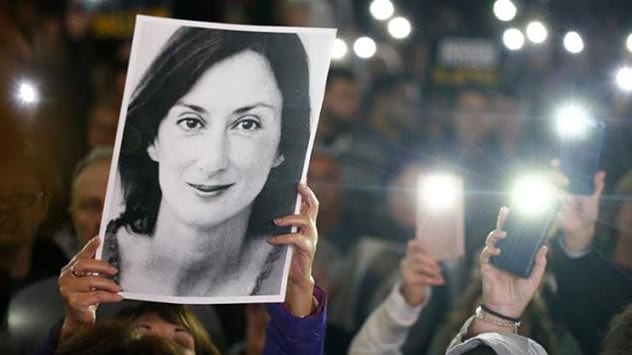
Within a four month period two years ago, the EU was shocked by the brazen murder of two anti-corruption journalists. In Malta, a car bomb killed blogger Daphne Caruana Galizia in October, 2017. The following February, Slovak investigative reporter Jan Kuciak was executed by gunshot in his home.
But while the two murders shared outward similarities (mafia links, the possible involvement of businessmen and politicians), the reactions were very different. In Slovakia, mass protests collapsed the government and led to an ongoing wave of arrests and anti-corruption purges at the highest levels. In Malta… nothing. The tainted government limped on, and PM Joseph Muscat even allowed – and participated in – a lawsuit against Caruana Galizia’s relatives for the “smears” she published. For a long time, it really seemed like accountability in Malta was falling behind a former Communist state.
Until now. In the aftermath of businessman Yorgen Fenech’s arrest last week, Maltese society has exploded. Three ministers linked to Fenech have been forced to resign from the government. There have been protests. The leader of the opposition has claimed Muscat’s government has been “hijacked by a criminal organization.” It could be we’re witnessing the first dominoes starting to topple.[2]
8Albania Suffered its Biggest Earthquake in Decades
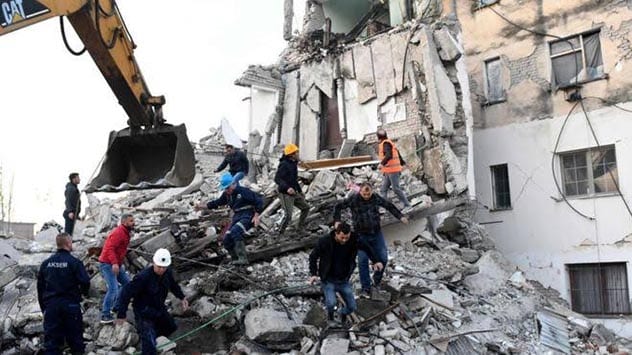
One of the poorest nations in Europe, Albania also has the bad luck to sit atop a notorious faultline, where the Eurasian and African plates meet. In the early hours of Tuesday morning, these two issues combined to create disaster. At 4am, a 6.4 magnitude quake hit just outside the capital, Tirana, and near the second city of Durres. Buildings collapsed. Homes were leveled. At time of writing, the death toll from the quake’s destruction has hit over 30, with hundreds injured.
Bad as the quake itself was, rescue efforts were hampered by the state of Albania’s economy. Though not as backward as it was under the Communist regime of Enver Hoxha, Albania is poor. Within Europe, only Moldova and Ukraine could claim to be poorer. As such, the quake completely overwhelmed Albania’s emergency responders, exacerbating the situation.
Thankfully, the nation’s neighbors have chipped in, with Greece and Italy donating funds and search and rescue teams. Still, the quake is easily Albania’s biggest natural disaster in decades.[3]
7 Bougainville Voted on Whether to Become the World’s Newest Nation

A small-ish island off the coast of Papua New Guinea (PNG), Bougainville is an obscure region within an already obscure country. But it may soon have a hefty claim to fame. Last Friday, a two week process started whereby the island’s citizens will choose whether to secede from PNG. If, as seems likely, a “yes” vote is returned, Bougainville will become the world’s newest country.
Relations between PNG and Bougainville have been strained for a long time. In the 1990s, the two fought a civil war that killed as many as ten percent of Bougainville’s population. In 2001 a peace deal was finally agreed on the basis that PNG would allow a referendum on independence. After nearly two decades of foot-dragging, that referendum has finally arrived.
The challenges for the vote are legion. Bougainville is almost totally rural, with no island-wide communication network, and a population with a literacy rate of roughly 50 percent. As a result, staging the vote has involved years of preparation, treks by officials to remote villages, and interactive plays explaining the entire process of voting to villagers. Additionally, should the vote pass, there is no time limit to implementing the result. Experts have warned PNG could dither a decade before letting Bougainville leave.[4]
6 Samoa’s Deadly Measles Outbreak was Traced to Anti-Vaxxers

When the measles vaccine was first introduced in 1963, it was a literal lifesaver. Hundreds – mostly children – died each year in the US alone. After the vaccine appeared, mortality rates plummeted 80 percent. For people at the time who’d lost a loved one to measles, the idea that, one day, people would choose not to take this preventative miracle would’ve seemed absurd.
Yet, here we are in late 2019, and yet another measles outbreak has been traced back to the insane cult of anti-vax. This time, it’s Samoa in the crossfire, where nearly 40 have died in the latest outbreak. 35 of those dead were children below the age of 4. Note to anti-vaxxers: when your propaganda starts literally killing children, it’s probably time to stop.
The Samoa outbreak started back in October, but it’s really hit the headlines this week as the tiny nation’s resources reached breaking point. Amazingly, soulless husks masquerading as social media influencers are continuing to target the country with anti-vaccine propaganda. Stay classy, guys.[5]
5 The New EU Commission Finally Formed
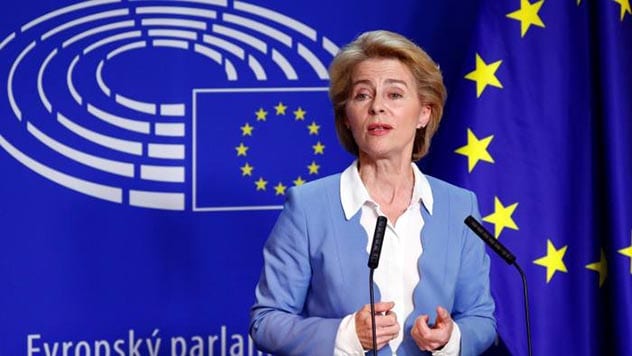
Like so much about the EU, the job of the commission is one that’s little understood outside political circles, and likely cared about even less. But its significance cannot be overstated. The European Commission is effectively the cabinet of the EU. It runs the continent on a day to day basis, proposing legislation, and making sure that legislation is respected in member states. It’s a body that influences the lives of 513 million people (451 million when – if – the UK finally leaves), and it’s just undergone a major change.
Following EU elections back in May, the term of the Commission headed by Jean Claude Juncker came to a close. After much wrangling in the fractured parliament, compromise candidate Ursula von der Leyen was chosen to replace him. This Wednesday – again, after much wrangling – Von der Leven’s team for the Commission was finally voted through. She will take up her new position formally on December 1.
The hard work begins almost immediately. The EU is having to deal with the loss of 13 percent of its population and its third largest economy as Brexit forges ahead. On top of that, the continent is more split than ever with the rise of the far-right on one hand, and hardcore leftwing parties on the other. How Von der Leven handles these challenges will set the future course of the world’s largest trading bloc.[6]
4 The UK Opposition Accused the Government of Selling the NHS

The UK’s National Health Service (NHS) is one of those peculiarly British institutions that everyone moans about, while simultaneously being ready to man the barricades and die for. Founded in the wake of WWII by the Labour government to provide free healthcare for the nation, it has remained largely under national ownership even as privatization has broken up nearly every other government monopoly.
But could all that change? As part of the ongoing UK election campaign, the Labour party revealed a leaked dossier this week that purported to show the NHS was on the table in post-Brexit trade talks with the US. It’s the sort of claim that could potentially blow the race wide open.
The documents relate to drug pricing and patents, a worrying trend to be sure, but not quite the fire sale the Labour Party sold it as. Still, with the NHS being a classic motivating factor for British voters, the claim could damage the Tories more than you’d expect. At least, Labour will hope that’s the case. Jeremy Corbyn’s leftwing party is currently trailing Boris Johnson’s Conservatives by anywhere between 11 and 19 points. At this stage, they’ll need a major upset to win. But, hey, the past few years have been all about major election upsets.[7]
3Australia Accused China of Trying to Install a Spy in its Parliament

On Sunday, Wang Liqiang sat down for an interview with Australian journalists. Over the next hour, he proceeded to unfurl a lurid tale of espionage, bribery, extortion, and possible murder that wouldn’t seem out of place in a late night thriller. According to Liqiang, he’s a former worker for Chinese intelligence who was intimately involved in a plot to embed a spy within Australia’s parliament. There was even a candidate: luxury car dealer Bo “Nick” Zhao, who was found dead in a motel room in March.
The plan was apparently for Zhao to become a candidate for the Liberal Party, use Chinese funds to make an impact, and then get elected into Parliament. This would be easier than it perhaps seems. According to security analysts, newly-elected MPs aren’t screened in such a way that would pick up spy connections. Infiltrating Australia’s parliament would be worryingly easy.
In response, Chinese media released a video purporting to show Wang Liqiang confessing in court to committing fraud in 2016, and claimed the man was an unemployed fantasist. It remains to be seen who is telling the truth.[8]
2Iraq’s Unrest Turned Deadly (Again)
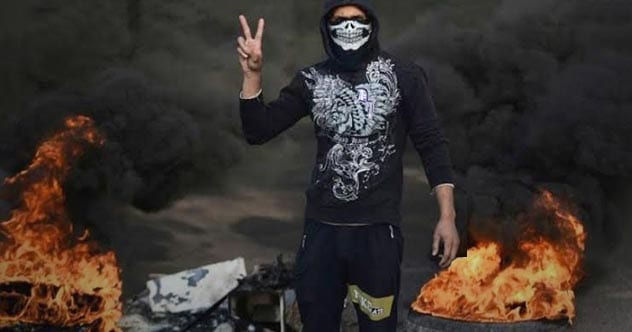
Chile. Hong Kong. Iran. Bolivia. Lebanon. The list of places experiencing mass protests against their governments seems to be growing ever longer, with more and more nations being shaken by political tremors.
This week, Iraq rejoined the list. After intense protests in October resulted in the deaths of 149 people, violence returned to the streets on Wednesday. In Najaf, protestors torched the Iranian consulate, with those inside only just managing to escape. The following day, separate protests in Nasiriya flew out of control, resulting in a minimum of 13 killed by security forces. The violence may presage an even bigger flare up.
Like many across the planet, those in Iraq are demonstrating for less corruption and better living conditions. And, like many governments across the planet, Iraq’s has responded with force. People have been beaten, injured by tear gas cannisters, and fired at with live rounds. Although Prime Minister Abdul Mahdi has offered to resign, no replacement who can command a majority in parliament has been found.[9]
1 Impeachment Star Witness was Accused of Harassment
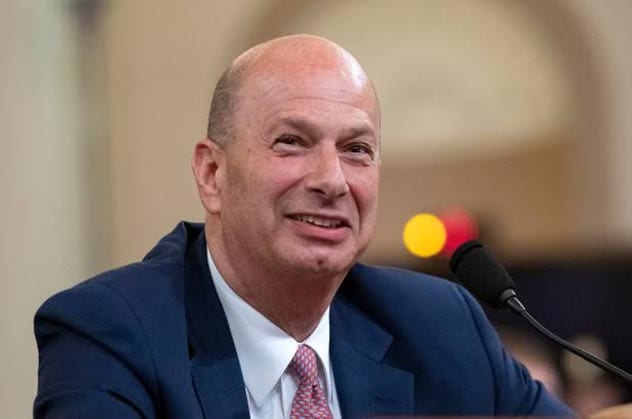
Another week, another twist in the ongoing saga of Donald Trump’s impeachment. Just last week, former US ambassador to the EU, Gordon Sondland, was in the news for dropping a bombshell about Trump’s alleged quid pro quo with Ukraine over investigating Joe Biden’s son. This week, it’s Sondland himself who is news.
On Wednesday, the magazine Portland Monthly published tales from three women who accused Sondland of harassing them. The accusations range from the one-time hotelier exposing himself, to retaliating against them professionally when they refused to sleep with him.
To call this story complicated would be to underestimate all the conflicting motivations and counterclaims flying back and forth. One of the named women in the story is the owner of the magazine doing the reporting, although she has said she did not interfere editorially. Perhaps as a result of this, Sondland has declared the entire thing is a politically-motivated hit job, designed to discredit by association his damaging testimony against Trump.
So, is this all a rightwing smear campaign? Or is Sondland the one cynically using liberal dislike of Trump to shield himself from the consequences of being a predator? Coming at the nexus of several movements in US politics – the impeachment proceedings, #MeToo, the #MeToo backlash, the Democratic primary – the story is perhaps the most-2019 thing we’ve yet covered. One thing’s for sure: whatever the truth, people will likely choose what they want to believe and tune everything else out.[10]








